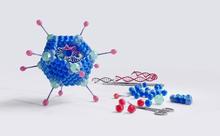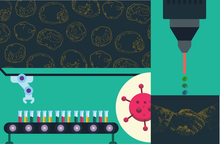WORKSHOP OVERVIEW
Regenerative medicine, including cell and gene therapy, provides an unprecedented potential to treat or cure previously intractable diseases, such as cancer and rare genetic diseases. Advances in manufacturing technologies, measurements, and standards are needed to ensure the safety, quality, and consistency of this new class of therapies and to reduce cost. NIST in collaboration with FDA has been working with the broader industry and stakeholders to develop global standards underpinned by a robust measurement infrastructure. NIST hosts multiple technical Consortia to jointly develop precompetitive technologies, measurement solutions, and standards to accelerate technology development and translation.
At the NIST-FDA Workshops on Measurements and Standards for Advanced Therapy, stakeholders from other federal agencies, industry, and academia will provide perspectives on identifying measurement challenges and innovative technology solutions, as well as standards to promote manufacturing innovation, improve supply chain resilience, and support characterization and testing to facilitate regulatory approval. The workshops will include sessions focused on:
- Identifying measurement needs, gaps, and solutions for gene delivery systems, including viral- and non-viral vectors to launch a new thrust to support their manufacturing and testing.
- The NIST Genome Editing Consortium will share and obtain feedback on current and future activities of the Consortium including control materials/assay qualification, data/metadata norms, and standard terms and definitions.
- The NIST Flow Cytometry Standards Consortium will share and obtain feedback on current and future activities of the Consortium including ways to characterize and standardize flow cytometer platforms for different applications, methods, and procedures enabling quantitative and standardized assay results, and generation of reference materials and controls as well as reference data.
QUICK LINKS:
Day 1: Wednesday, November 1, 2023
Gene Delivery Systems Public Workshop (8:30 am to 5:00 pm ET)

Emerging biotechnology, including gene therapy, is underpinned by the ability to manipulate the genes and genomes within living systems. Gene delivery is a process by which foreign nucleic acid is introduced to host cells through mechanical, chemical, and biological approaches. The field is developing an increasing number of gene delivery systems or encapsulated and/or protected genes that can be delivered to the targeted site in vivo or ex vivo.
This workshop aims to identify measurement solutions and standards for gene delivery systems, including improving measurement confidence by establishing traceability and assisting measurement comparability. Measurement applications to be discussed will include the use of a diverse set of tools and capabilities for the characterization and testing of quality attributes such as identity, purity, titer, functional activity, and/or potency. Reference materials to benchmark the gene delivery systems and to support measurement quality will be addressed. Presentations and discussions at breakout sessions will guide the activities of the new NIST Gene Delivery Systems Working Group.
Day 2: Thursday, November 2, 2023
Genome Editing Consortium Public Workshop (9:00 am to 5:00 pm ET)

Targeted genome editing technologies are being leveraged across many sectors of the bioeconomy to develop commercial products including gene therapies. Established in 2018, the NIST Genome Editing Consortium supports the development of groundbreaking tools and standards required to detect and monitor the accuracy and precision of genome editing technologies for the U.S. and global biotechnology sectors.
On Thursday, November 2, 2023, NIST will host a one-day public workshop to share and obtain feedback on current and future efforts of the NIST Genome Editing Consortium in the areas of control materials/assay qualification, data/metadata norms, and standard terms and definitions. Future potential Consortium activities to be discussed include controls and qualification of off-target assays, and genome editing reagent qualification. Expected outcomes include a shared knowledge of challenges and recent advances in genome editing measurements assurance/measurement technologies, an increased awareness of the Consortium and its activities, and stakeholder feedback to help inform the Consortium efforts.
NIST Flow Cytometry Standards Session (members only) (9:00 am to 12:00 pm ET)
The purpose of this session is to share with present consortium members summary results of the two consortium interlaboratory studies analyzed by participants and by multiple centralized data analyses. A follow-up discussion will focus on significant findings and lesson learned from the first round of interlaboratory studies and future study plans in addition to appropriate actions to better prepare for next round of consortium studies.
Day 3: FRIDAY, November 3, 2023
Flow Cytometry Standards Consortium Public Workshop (8:30 am to 5:00 pm ET)

Flow cytometry is widely used by biopharmaceutical manufacturers to produce therapies that are made by living cells or composed of living cells. Established in 2020, the NIST Flow Cytometry Standards Consortium is working with industry and other partners to develop measurements, standards, and technology needed to accelerate the translation, manufacturing, and approval of new therapies.
On Friday November 3, 2023, NIST will host a one-day public workshop to share and obtain feedback on current and future efforts of the NIST Flow Cytometry Standards Consortium. Consortium activities to be discussed include ways to characterize and standardize flow cytometer platforms for different applications, methods, and procedures enabling quantitative and standardized assay results, and generation of reference materials and controls as well as reference data. Key findings of on-going interlaboratory studies involving present Consortium members will be included in this discussion. Expected outcomes include a shared knowledge of challenges and recent advances in instrumentation, therapy modalities and significant measurands, and an increased awareness of the Consortium and its activities as well as stakeholder feedback to help inform the Consortium work plan on next steps.
NIST Genome Editing Consortium Members Meeting (members only) (9:00 am to 12:00 pm ET)
This session is only accessible to NIST Genome Editing Consortium Members. The session will be used to discuss future directions for ongoing projects within each of the consortium working groups. Feedback and proposals for future directions in off-target assays and quality of reagents will also be discussed.
IBBR is strategically located just northwest of Washington, DC, in the heart of Maryland’s biotechnology corridor, adjacent to The Universities at Shady Grove.
IBBR Recommended Hotel Accommodation
Hilton Garden Inn
14975 Shady Grove Road | Rockville, MD 20850
240-507-1800
Visit Website

